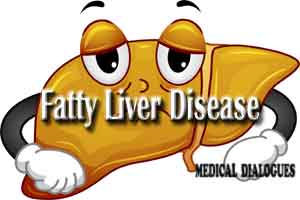- Home
- Editorial
- News
- Practice Guidelines
- Anesthesiology Guidelines
- Cancer Guidelines
- Cardiac Sciences Guidelines
- Critical Care Guidelines
- Dentistry Guidelines
- Dermatology Guidelines
- Diabetes and Endo Guidelines
- Diagnostics Guidelines
- ENT Guidelines
- Featured Practice Guidelines
- Gastroenterology Guidelines
- Geriatrics Guidelines
- Medicine Guidelines
- Nephrology Guidelines
- Neurosciences Guidelines
- Obs and Gynae Guidelines
- Ophthalmology Guidelines
- Orthopaedics Guidelines
- Paediatrics Guidelines
- Psychiatry Guidelines
- Pulmonology Guidelines
- Radiology Guidelines
- Surgery Guidelines
- Urology Guidelines
Type 2 diabetes increases risk of fatty liver disease, finds study

Increased blood sugar in Type 2 diabetes mellitus (T2DM) is associated with risk for nonalcoholic fatty liver disease (NAFLD) and considered a major risk factor for clinically significant liver disease. The study has appeared in the Journal of Clinical Gastroenterology and Hepatology.
Type 2 diabetes is a risk factor for the development of cirrhosis and hepatocellular carcinoma. However, the risk factor that identifies persons with the highest risk for these outcomes is missing from unselected, population-based cohorts.
Diabetes is a disease that occurs when blood sugar, is too high. Blood sugar is the main source of energy and comes from the food consumed. Insulin, a hormone made by the pancreas, helps glucose from food get into your cells to be used for energy. Sometimes insulin production or utilisation is faulty as a result of which blood sugar though present in the blood doesn’t reach the cells.
During a median follow-up of 7.7 years, 1.3% of patients with T2DM and 0.6% of controls developed the severe liver disease (hazard ratio, 2.3; P<0.001). HCC rates were also significantly higher in individuals with T2DM versus controls (0.26% vs. 0.08%), as were liver-related death rates (0.49% vs. 0.22%). Among those with T2DM, independent predictors of severe liver disease included male sex, older age, higher body-mass index, hypertension, and renal abnormalities (lower glomerular filtration rate and microalbuminuria), whereas statin use was a protective factor.
The risk for severe liver disease was increased in patients with type 2 diabetes compared to controls (hazard ratio, 2.28; 95% CI, 2.21–2.36). Risk factors associated with severe liver disease in persons with type 2 diabetes were higher age, male sex, hypertension, higher body mass index, lower glomerular filtration rate, microalbuminuria, and smoking. Statins were associated with a decreased risk of severe liver disease.
The researchers concluded that Persons with type 2 diabetes have an increased risk of severe liver disease. Knowledge of risk factors can be helpful in identifying persons with type 2 diabetes who have a high risk of severe liver disease. Future studies should evaluate how best to utilize these risk factors to develop more-targeted approaches to screening for NAFLD in clinical practice.
For further reference log on to :
Björkström K et al. Risk factors for severe liver disease in patients with type 2 diabetes. Clin Gastroenterol Hepatol 2019 Apr 19; [e-pub]. (https://doi.org/10.1016/j.

Disclaimer: This site is primarily intended for healthcare professionals. Any content/information on this website does not replace the advice of medical and/or health professionals and should not be construed as medical/diagnostic advice/endorsement or prescription. Use of this site is subject to our terms of use, privacy policy, advertisement policy. © 2020 Minerva Medical Treatment Pvt Ltd